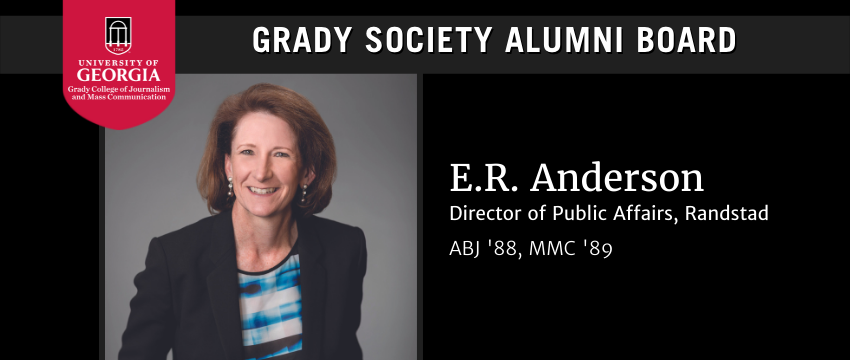Grady Society Alumni Board Profile: E.R. Anderson

Grady Society Alumni Board Profile: E.R. Anderson
We are grateful for the support and enthusiasm of our Grady Society Alumni Board members. This series profiles members of the alumni board who make a positive difference in our College.
E.R. Anderson (ABJ ’88, MMC ’89) is the director of public affairs for the global staffing firm Randstad. She is establishing the company’s first-ever public affairs and government relations function in the nation’s capital where she is building relationships and telling the story of a Netherlands-based company with its U.S. headquarters in Atlanta that puts people to work. Anderson spent 20 years at the nexus of government, politics, policy and communications. She served as the communications director for U.S. Senator Pat Toomey in the four years leading up to his reelection. Prior to that, she was the committee spokesperson for Ranking Member Susan Collins on the Senate Homeland Security committee. In the George W. Bush administration, Anderson held roles of increasing responsibility at the U.S. Commerce Department. She began as the communications advisor to the undersecretary of economic affairs, later chief of staff and finally deputy undersecretary for economic affairs. Anderson started her time in D.C. working in the U.S. House of Representatives. She observed elections in Cambodia, Nicaragua, Nigeria, Slovakia and Ukraine.
E.R. is an avid golfer and Georgia football season ticket holder.

Why are you involved with the GSAB?
The GSAB has been a great way to reconnect with the J-school and with Athens. I enjoy meeting the other members of the board and learning about their cool jobs. It’s a good way for me, as a mid to late career person, to learn what’s new in communications and storytelling.
What advice do you have for today’s Grady College students?
Do not turn down a job that hasn’t been offered. You aren’t too big to hold the Senator’s purse. Don’t talk in the elevators on Capitol Hill. Nod and say good morning to the janitors and the lunch ladies.
What experience during your time at Grady College had the biggest influence on where you are today?
Professor Roland Page and his experience as the press secretary for the governors of Florida and Pennsylvania made politics-centric public affairs sound exciting and meaningful. I enjoyed his real world experience, and because of him I never use the word “utilize.”
Looking back at your time at Grady, is there anything you wish you had done (classes you had taken, skills you would have liked to have learned, clubs to be involved with) that would help you with what you are doing today?
Oh yes. I wish I had written for The Red and Black every week, not just every semester. I wish I had volunteered with Claude Felton in the sports information office. I wish I had studied for a term in St. Andrews, Scotland and played the Old Course every afternoon.
How has the network of fellow Grady College alumni helped you in your career?
When I started at Randstad this May both my contract lobbyist and my public relations vendor were Grady grads. I knew I was in good hands.
What modern challenges would you like to see current students and recent College alumni solve?
I’d like for students today to put the phones down. I see a lot of people watching life on the three-inch screen.
How has your field changed from your graduation to now?
Everyone thinks politics is more divisive than ever. I am not sure that’s true. I mean we had a Civil War, duels and one congressman beat a senator with a stick in the 1800s. But it is divisive today. I think there are several reasons but here are three: siloed media and social media where you only see news you agree with and the increase of “safe seats” in the House. Technology and demographic trends allow the redistricting to be so precise as to carve out a neighbor or a house, eliminate purple seats and make it more difficult for moderate candidates to win.